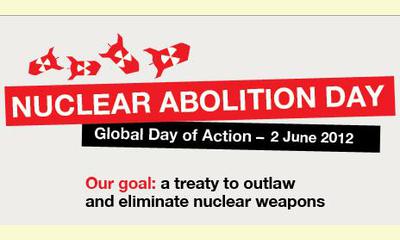|
|
Ten Actions for Nuclear Abolition Day - June 2
un article par Nuclear Abolition
Video: Nuclear Abolition Day
Here are ten actions that you can do to help abolish nuclear weapons.
Action 1: Organize a flash mob. Flash mobs are an effective way to capture people's attention and raise awareness. On 2 June groups will assemble in public spaces and simulate a nuclear disaster by suddenly falling to the ground. They will carry radiation signs to make their purpose clear.

click on photo to enlarge
Action 2: Round robin. You can show your foreign policy maker that the support for a treaty banning nuclear weapons is widespread and strong by organising a petition. Politicians care about what their voters care about, and if the support for an idea is strong enough, they will be forced to act.
Action 3: Collect video 'pleas'. Collect video "pleas" for a nuclear-weapon-free world. All you need is a video camera, a laptop computer with a built-in camera or a mobile phone with a built-in camera. Our aim is to create the world longest video message urging world leaders to abolish all nuclear weapons.
Action 4: Write to your mayor. The mayors of more than 5200 cities in 153 countries have joined the Mayors for Peace network calling for the complete elimination of nuclear weapons by 2020. Is your mayor one of them? Help us to build the network, and demand that cities are not targets.
Action 5: Write to a politician. On 2 June, print and send a letter to one or more parliamentarians in your country, and urge him or her to push your government to support or initiate negotiations for a treaty banning nuclear weapons.
Action 6 Tweet for abolition. To get negotiations for a treaty banning nuclear weapons going, we need to convince enough foreign policy makers that they have a responsibility to take a clear position on this issue. Many foreign policy makers are active twitter users, and are responsive to the tweets they receive.
Action 7: : Change your profile pic. On 2 June upload a Facebook profile picture of you holding a sign reading “Abolish Nuclear Weapons”, or any other slogan calling for a nuclear-weapon-free world. Then tell your Facebook friends why you believe abolishing nuclear weapons is an urgent necessity.
Action 8: : Fold paper cranes. Japanese paper cranes symbolize the will of the world's people to achieve nuclear disarmament. One 2 June, people of all ages will fold paper cranes and send them to political leaders urging them to commence negotiations on a treaty to outlaw and eliminate all nuclear weapons.
Action 9: Hold a protest. On 2 June, groups will non-violently blockade nuclear weapons bases, as well as leaflet nearby houses. Others will protest outside the embassies of nuclear-armed countries and call for negotiations on a treaty to outlaw and eliminate all nuclear weapons.
Action 10: Screen a film. June 2 is a perfect occasion for holding an anti-nuclear film screening. There are a number of great new films available, such as Beating the Bomb, which can be screened free of charge. You could even use the event as your own fundraiser.
|








|
DISCUSSION
Question(s) liée(s) à cet article:
Can we abolish all nuclear weapons?,
* * * * *
Commentaire le plus récent:
'THE WORLD IS OVER-ARMED AND PEACE IS UNDER-FUNDED'
30 August 2012 — The following opinion piece by Secretary-General BAN Ki-moon has appeared in leading newspapers in Argentina, Bangladesh, Burundi, China, Germany, India, Iran, Italy, Japan, Lebanon, Malaysia, The Philippines, Republic of Korea, Russia, Serbia, Turkey, Ukraine and European weekly publications and has been translated into 10 languages.
Last month, competing interests prevented agreement on a much-needed treaty that would have reduced the appalling human cost of the poorly regulated international arms trade. Meanwhile, nuclear disarmament efforts remain stalled, despite strong and growing global popular sentiment in support of this cause.
The failure of these negotiations and this month's anniversaries of the atomic bombings at Hiroshima and Nagasaki provide a good opportunity to explore what has gone wrong, why disarmament and arms control have proven so difficult to achieve, and how the world community can get back on track towards these vitally important goals.
Many defence establishments now recognize that security means far more than protecting borders. Grave security concerns can arise as a result of demographic trends, chronic poverty, economic inequality, environmental degradation, pandemic diseases, organized crime, repressive governance and other developments no state can control alone. Arms can't address such concerns.
Yet there has been a troubling lag between recognizing these new security challenges, and launching new policies to address them. National budget priorities still tend to reflect the old paradigms. Massive military spending and new investments in modernizing nuclear weapons have left the world over-armed -- and peace under-funded.
Last year, global military spending reportedly exceeded $1.7 trillion – more than $4.6 billion a day, which alone is almost twice the UN's budget for an entire year. This largesse includes billions more for modernizing nuclear arsenals decades into the future.
This level of military spending is hard to explain in a post-Cold War world and amidst a global financial crisis. Economists would call this an "opportunity cost". . ... continuation.

|
|









